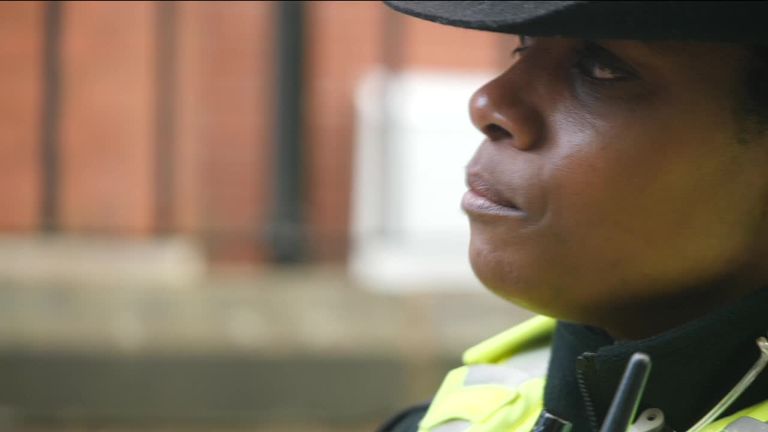Black Lives Matter: Black officer says police jacket 'feels heavier' after George Floyd killing
DCI Karen Geddes has said, as a black woman, she considers George Floyd family even though she is no relation to him.
Tuesday 14 July 2020 17:49, UK
A black officer in the UK has told Sky News her police jacket "feels heavier" after the US killing of George Floyd and the anti-racism protests which followed.
The Black Lives Matter (BLM) demonstrations across Britain have left many black officers in a difficult position.
Some have been outraged at what happened to Mr Floyd in Minneapolis last month, while they also deal with tensions within their communities.
Detective Chief Inspector Karen Geddes said, as a black woman, she still considers Mr Floyd family even though she is no relation to him.
He was filmed on the ground in custody with a police officer's knee on his neck for eight minutes and 46 seconds before he died.
DCI Geddes said: "When I heard about George Floyd and I saw the video it hurt me. As a black person it hurts and to have to be able to put this on, this is a heavy jacket, but it feels heavier at the moment."
Uniform aside, she stands in solidarity with protesters across the country, and she is disturbed by the footage that captured Mr Floyd's arrest and final moments.
DCI Geddes said his death is being felt "across the UK and police officers are also hurting too".
She said: "I went to a protest in Wolverhampton and I tried to kneel for eight minutes and 46 seconds and I couldn't.
"It hurts to be able to have to go to work and represent an organisation that did something like that to one of my community.
"But ultimately the way I see it - somebody needs to be inside the organisation to stop it happening."
And she believes she can do more from inside the force rather than outside.
After joining West Midlands Police in 1992, she went on to become one of the first black women to reach the rank of DCI.
Figures show black officers make up only 1.2% of police officers in England and Wales. Home Office data also shows they are severely under-represented in senior ranks.
While many black officers have been unable to publicly grieve or protest, some have sought to show their support by taking the knee.
PC Steven Mason was lauded after a video went viral of him kneeling with demonstrators at a BLM protest in Birmingham.
He said: "My purpose at the protest was to engage with the crowd. It was a challenge. I decided to stand in complete solidarity with the demonstrators, so when they were saying 'On your knee', I just said 'Yes, why not?'
"I wasn't pressured to do it. I was more challenged to do it."
Black officers like PC Mason have said high-profile deaths in custody of black people can often make the job more difficult.
The National Black Police Association said minority ethnic officers have reported being insulted by people from their own communities because of their jobs.
:: Listen to Divided States on , , , and
Britain's first black chief constable, Michael Fuller, said nationwide protests were forcing police forces to confront the treatment of minority ethnic officers and their lack of progression in the service.
While a serving officer, Mr Fuller admits he was the victim of racial abuse.
He said: "There still haven't been any black chief constables since I retired in 2010. Black police officers face a harder time. They often get a harder time from their friends and families. As well as racism in the force, there is still an issue of racism outside the force.
"We want black people to feel confident they will be treated fairly in the eyes of the law so we need to change the way we police and build trust."
Race and Revolution: Is Change Going to Come?
On Tuesday night at 8pm, Sky News will also broadcast global debate show Race and Revolution: Is Change Going to Come?
It will look at the issues raised by the Black Lives Matter protests, and examine institutional racism and how we fix it.









